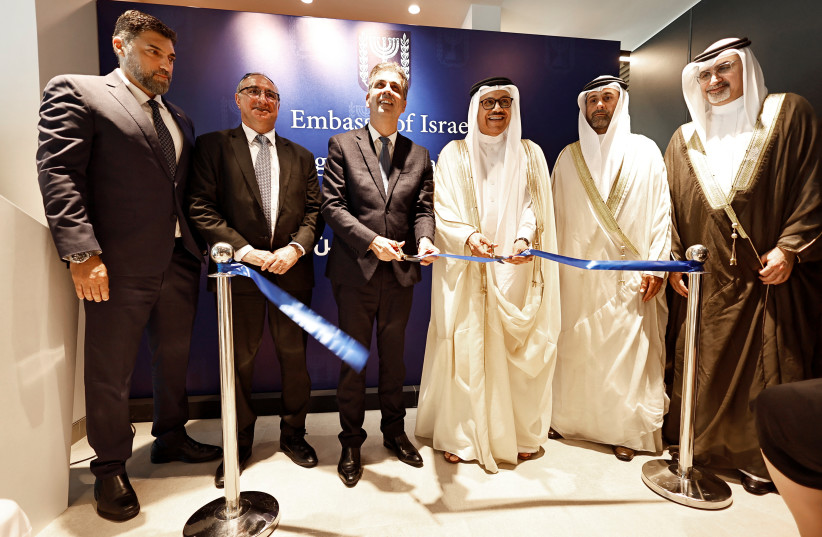Bahrain underscored the importance of a two-state resolution to the Israeli-Palestinian conflict as it celebrated the opening of the first Israeli embassy in its capital and spoke of the importance of the frozen Negev forum.
The Israeli embassy’s opening is a “historic step” that is a “further important milestone in the relations between the two countries and reflects our support for the embassy’s diplomatic efforts to further develop bilateral relations,” Bahraini Foreign Minister Abdullatif Al Zayani.
He celebrated the moment by hosting Foreign Minister Eli Cohen, who made his first visit to Bahrain since taking office, to mark the moment. Cohen met both with Zayani and Crown Prince Salman bin Hamad Al Khalifa.
“This visit will be a further important staging post in the development of our cooperation across the widest range of fields, benefiting not just out two countries .. but also the security, stability and prosperity of the wider Middle East region,” he said.
There is a value to “deepening these ties,” Zayani said.

The elephant in the room: Palestinian statehood
He recalled, however, the importance of Palestinian statehood, an issue which he explained came up in Khalifa’s meeting with Cohen.
“In the meeting, his royal highness, the deputy King reiterated the importance of resolving the Palestinian-Israeli conflict through a two-state solution as outlined in the Arab Peace Initiative,” Zayani said. The initiative put forward, in 2002 calls for an Israeli withdrawal to the pre-1967 lines. It’s a move that Israel has opposed but which the Palestinians, the Arab world and the International community all support.
Zayani clarified, however, that relations with Israel could move forward despite the absence of a resolution to the conflict. He said he supported the continued meeting of a US-backed group of six countries called the Negev Forum. This includes representatives from the US, Israel, Egypt, Morocco, Bahrain and the United Arab Emirates.
There has not been a meeting of foreign ministers belonging to the forum since Prime Minister Benjamin Netanyahu’s new government came into office. A foreign ministerial meeting planned for Morocco in March, never took place.
“We both noted how the Negev Forum process can be a key driver of security and prosperity throughout our region and an example of what can be achieved by .. cooperation among like-minded states,” he said.
Israel normalized ties with Bahrain in 2020, under the auspices of the US-backed Abraham Accords under which Israel also forged public diplomatic ties with the United Arab Emirates, Morocco and Sudan.
Conversations in Manama also focused on the possibility of a free trade agreement with Israel, which already has such an agreement with the United Arab Emirates.
Cohen said that he and his Bahrain counterpart agreed that they “should work together to increase the number of direct flights, the tourism, the trade volume, the investments.”
To strengthen these ties, Cohen said, he brought a delegation of 30 Israeli business people.
Analysts said the rapprochement with Israel was forged partly through shared fears of Iran.
Bahrain, home to the US Navy's Fifth Fleet, is a small island on the Gulf where Saudi Sunni allies, the Al Khalifa royal family, rule over a Shi'ite majority.
Analysts said the rapprochement with Israel was forged partly through shared fears of Iran.
The opening of the Israeli embassy in Bahrain came as the United States is pressing its traditional ally Riyadh to sign a similar deal for Saudi Arabia, a Muslim powerhouse and home to Islam's holiest shrines.
However, Riyadh has so far resisted US pressure and linked the move to the creation of a Palestinian state as part of a two-state solution to the Israeli-Palestinian conflict, along with other demands.
A much needed win
The visit also comes as skepticism is high as to whether Netanyahu’s government can maintain the momentum of the Abraham Accords, particularly in light of its stance against a Palestinian state and extremist statements made by some of the coalition’s ministers.
Cohen drew domestic and international ire last week following his decision to prematurely publish details of a secret meeting with his Libyan counterpart Najla Mangoush in Rome last week. Mangoush was fired as a result of the meeting and was forced to flee the country, casting doubt on the future possibility of a normalization deal between Israel and Libya.
In Manama, Cohen still sounded an optimistic note about Israel’s diplomatic abilities in the Middle East.
“There are [now] more Arab and Muslim countries that have shown interest in taking a step forward in joining the peace circle,” he said.
Reuters contributed to this report.
